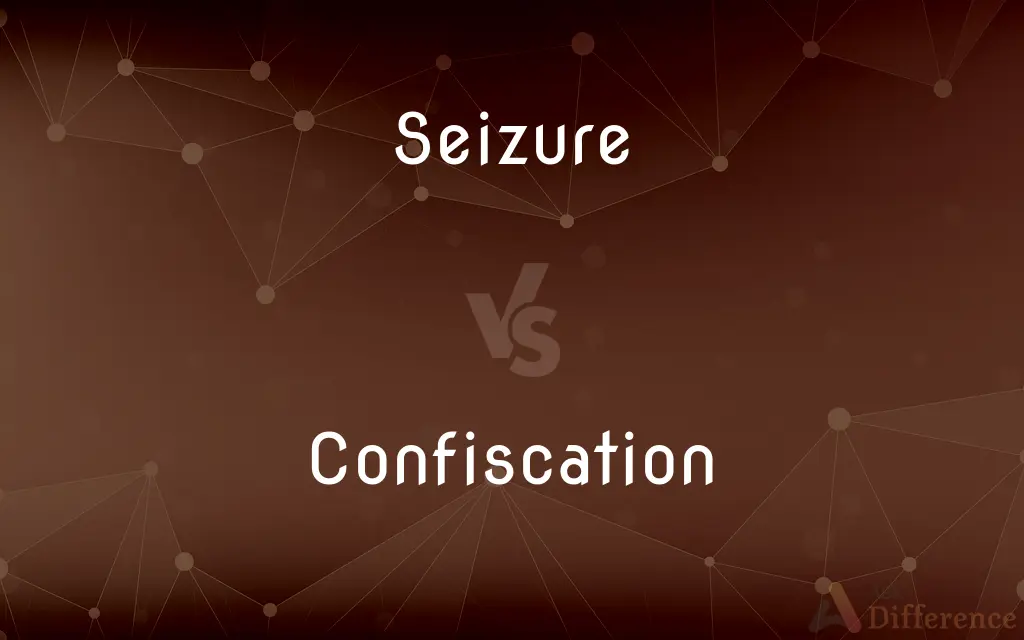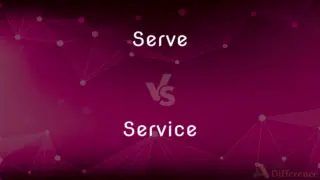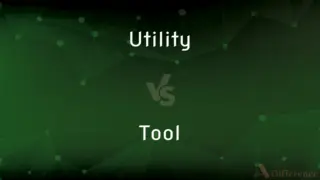Seizure vs. Confiscation — What's the Difference?
By Fiza Rafique & Urooj Arif — Updated on April 2, 2024
Seizure is the act of taking possession temporarily, often for legal examination, whereas confiscation is permanent, implying ownership transfer due to law violation.

Difference Between Seizure and Confiscation
Table of Contents
ADVERTISEMENT
Key Differences
Seizure and confiscation are terms commonly used in legal contexts to describe the act of taking property, but they have distinct meanings and implications. Confiscation, on the other hand, is a legal process resulting in the permanent taking away of property by a public authority. It usually occurs as a penalty for legal violations, where the ownership of the property is transferred to the state or government.
Seizure refers to the act of taking hold of something temporarily by legal authority, often for the purpose of examination or to prevent illegal activity. It implies a temporary control over the property without transferring ownership. Confiscation is more severe than seizure, indicating a permanent loss of property as a form of punishment.
In practice, the terms are used in various legal contexts, including criminal law, where they serve as tools for law enforcement to combat illegal activities. While both aim to disrupt illegal activities, their implications for the property owner are significantly different, reflecting the severity and permanence of the action taken.
The process of seizure can be a precursor to confiscation, where property initially seized for investigation is later confiscated if found to be connected to illegal activities. Confiscation, however, entails that the property will not be returned to the original owner.
Comparison Chart
Definition
Temporary taking of property by legal authority.
Permanent taking away of property as a penalty.
ADVERTISEMENT
Ownership
Remains with the original owner.
Transferred to the state or government.
Duration
Temporary, until a specific condition is met.
Permanent, with no intention of returning.
Purpose
Often for examination or to prevent illegal activity.
As a penalty for legal violations.
Legal Outcome
Property may be returned if no violation is found.
Property is not returned, indicating a penalty.
Compare with Definitions
Seizure
Can be a precursor to legal actions or further investigation.
The drug seizure led to a comprehensive investigation of the network.
Confiscation
The permanent taking away of property as a form of penalty.
The court ordered the confiscation of assets derived from illegal activities.
Seizure
Does not transfer ownership; aimed at temporary control.
Following the seizure, the items were cataloged for court proceedings.
Confiscation
Implemented through legal proceedings, ensuring due process.
The legal system ensures that confiscation decisions undergo thorough review.
Seizure
Often conducted to prevent illegal activities or for investigation.
The seizure of counterfeit money was crucial to the fraud investigation.
Confiscation
Serves as a punishment for involvement in illegal activities.
The businessman faced confiscation of properties tied to financial fraud.
Seizure
The act of legally taking temporary possession of property.
The police conducted a seizure of goods from the suspect's house for evidence.
Confiscation
Involves the transfer of ownership to the state or government.
Confiscation laws enable the government to claim proceeds from drug trafficking.
Seizure
Requires legal authority or a warrant in most jurisdictions.
The officers executed a seizure of assets with a valid court warrant.
Confiscation
Can follow a seizure if the property is proven to be involved in crimes.
After the seizure and trial, the convict's properties were subject to confiscation.
Seizure
A seizure, formally known as an epileptic seizure, is a period of symptoms due to abnormally excessive or synchronous neuronal activity in the brain. Outward effects vary from uncontrolled shaking movements involving much of the body with loss of consciousness (tonic-clonic seizure), to shaking movements involving only part of the body with variable levels of consciousness (focal seizure), to a subtle momentary loss of awareness (absence seizure).
Confiscation
Confiscation (from the Latin confiscare "to consign to the fiscus, i.e. transfer to the treasury") is a legal form of seizure by a government or other public authority.
Seizure
The act or an instance of seizing or the condition of being seized.
Confiscation
To seize (private property) for the public treasury, especially as a penalty for wrongdoing.
Seizure
A sudden attack, spasm, or convulsion, as in epilepsy or another disorder.
Confiscation
To seize by authority
The teacher confiscated all the comic books we had in class.
Seizure
The act of taking possession, as by force or right of law.
The seizure of a thief, a property, a throne, etc.
The search warrant permitted the seizure of evidence.
Confiscation
Seized by a government; appropriated.
Seizure
A sudden attack or convulsion, (e.g. an epileptic seizure).
He fell to the floor and convulsed when the epileptic seizure occurred.
Confiscation
Having lost property through confiscation.
Seizure
A sudden onset of pain or emotion.
He felt the sudden seizure of pain as the heart attack began.
Confiscation
The act or process of confiscating.
Seizure
That which is seized, or taken possession of; a thing laid hold of, or possessed.
Confiscation
The act or process of taking property or condemning it to be taken, as forfeited to the public use.
The confiscations following a subdued rebellion.
Seizure
(obsolete) Retention within one's grasp or power; possession; ownership.
Confiscation
Seizure by the government
Seizure
To undergo an epileptic seizure.
Seizure
The act of seizing, or the state of being seized; sudden and violent grasp or gripe; a taking into possession; as, the seizure of a thief, a property, a throne, etc.
Seizure
Retention within one's grasp or power; hold; possession; ownership.
Make o'er thy honor by a deed of trust,And give me seizure of the mighty wealth.
Seizure
That which is seized, or taken possession of; a thing laid hold of, or possessed.
Seizure
A sudden occurrence (or recurrence) of a disease;
He suffered an epileptic seizure
Seizure
The act of forcibly dispossessing an owner of property
Seizure
The act of taking of a person by force
Seizure
The taking possession of something by legal process
Common Curiosities
What does confiscation mean?
Confiscation is the permanent removal of property by the state as a penalty for legal violations, transferring ownership to the government.
Is confiscation always permanent?
Yes, confiscation is a permanent action where the property is not intended to be returned to the original owner.
What is seizure?
Seizure is the legal process of taking temporary possession of property by authority, often for investigation or to prevent illegal activities.
Do seizure and confiscation apply only to physical property?
No, these processes can apply to both physical and intangible property, including digital assets and financial holdings.
How does seizure work as a law enforcement tool?
Seizure allows law enforcement to temporarily remove potentially illegal property from circulation, aiding in investigations or preventing further illegal activities.
What is the purpose of confiscation in legal terms?
The purpose of confiscation is to penalize individuals for illegal activities, deter future crimes, and remove the proceeds of crime from criminals.
Can seized property be returned to the owner?
Yes, seized property can be returned if it is determined that no legal violations occurred or if the property is no longer needed for evidence.
What happens to property after it is confiscated?
Confiscated property is typically used by the government or sold, with proceeds often going towards law enforcement efforts or restitution.
How do seizure and confiscation differ in terms of ownership?
In seizure, ownership remains with the original owner, while in confiscation, ownership is transferred to the state or government.
What legal authority is required for seizure and confiscation?
Both actions require legal authority, often a court order or warrant, and are conducted under specific laws and regulations.
Can both seizure and confiscation be challenged in court?
Yes, individuals can challenge both seizure and confiscation in court, often through legal proceedings designed to ensure due process.
Are there specific crimes that lead to confiscation?
Confiscation is typically associated with serious crimes, such as drug trafficking, financial fraud, or other illegal activities leading to financial gain.
What safeguards exist against wrongful seizure or confiscation?
Legal systems provide safeguards such as the requirement for a warrant, the right to a hearing, and the ability to challenge the action in court.
Is the process for seizure and confiscation the same worldwide?
While the general principles are similar, the specific processes and laws governing seizure and confiscation
Can anyone authorize the seizure of property?
No, only authorized personnel, such as law enforcement officers with a valid warrant or court order, can legally conduct a seizure.
Share Your Discovery

Previous Comparison
Serve vs. Service
Next Comparison
Utility vs. ToolAuthor Spotlight
Written by
Fiza RafiqueFiza Rafique is a skilled content writer at AskDifference.com, where she meticulously refines and enhances written pieces. Drawing from her vast editorial expertise, Fiza ensures clarity, accuracy, and precision in every article. Passionate about language, she continually seeks to elevate the quality of content for readers worldwide.
Co-written by
Urooj ArifUrooj is a skilled content writer at Ask Difference, known for her exceptional ability to simplify complex topics into engaging and informative content. With a passion for research and a flair for clear, concise writing, she consistently delivers articles that resonate with our diverse audience.
















































